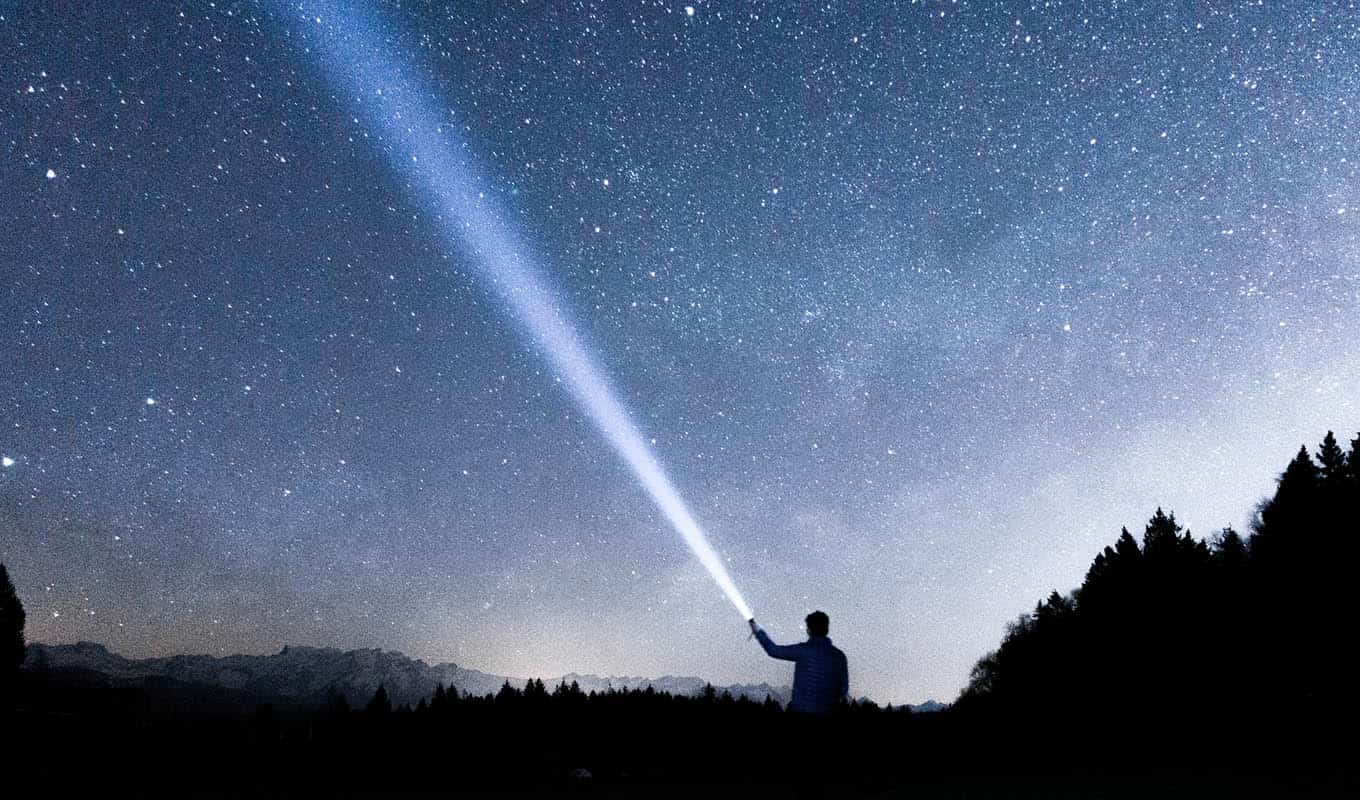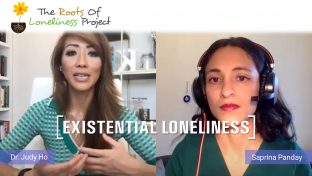Cosmic Loneliness: Pondering The Universe And Our Place In It

Moments of cosmic loneliness are often deep-seated, coming from places we didn’t even know existed inside of us.
Key Takeaways:
- Often arising during periods of major life changes, cosmic loneliness is a normal part of the human experience and 55% of people contemplate the meaning of life at least once per week.
- Because there are still so many unanswered questions about the universe (and our place in it), contemplation of those unknowns can lead to feelings of loneliness.
Struggling with loneliness or having a mental health crisis?
- Suicide Prevention Lifeline: 1-800-273-TALK (8255); Deaf or hard of hearing dial 711 before the number or connect via online chat
In quiet moments of contemplation, our minds are free to explore the darkest and least understood corners of wonder.
Lost in thought, we ruminate on the fabric of human existence — and what it all means — or ponder the notion that we may be completely alone in the universe.
Sometimes, the places where our thoughts land can be terrifying. What if we are truly, utterly alone?
For centuries, poets, scholars, and others have pondered being alone; it isn’t unique to our modern existence.
We live our entire lives on a giant rock holding history and entertainment, water and wind, pain and joy.
Sometimes it is simply too much to consider — the meaning of life, the point of it all, or the possibility that it doesn’t really matter.
If you’ve ever felt this way, yourself, you’re far from alone.
What Is Cosmic Loneliness?

If you’ve ever wondered “Are we alone in the universe?” or the eventual question that springs from that bottomless well — “What if we are alone in the universe?” — you may have experienced cosmic loneliness.
Intrinsically connected to the existential questioning of the universe and our place in it, cosmic loneliness is a feeling associated with the idea that we are alone — in all of creation.
In an endless sea of the unknown, we are all there is.
Looking up at the night sky is akin to staring into the abyss. It could swallow us whole — if it wanted to. And yet, we can’t help but be fascinated by it.
Our connection to the cosmos is something scientists, philosophers and philistines alike have pondered for centuries.
Somehow, regardless of reason, we’re all here, beyond meaning, existing in space, connecting time to reality and reality to physicality.
The night sky often illuminates grand feelings of cosmic loneliness in me.
Looking up at the moon and the stars, I see a seemingly natural net — the atmosphere holding us all together. And yet, underneath it all, I feel so very singular in my own experience.
I think about the world at large…about aliens, about life outside of our lives.
Are we really just products of sexual urges and expression? What if we are the only things out there?
What if there is more? What if there is nothing?
Does any of this hold meaning?
According to this YouGov study, 59% of Britons think that life has meaning, while 26% do not.
Though frightening at times to consider why we are here, it is a perfectly normal and natural thought to have.
When I notice myself wondering about the universe and feeling particularly alone in it, an unprecedented sensation of apprehension blooms within me.
I do not like to think too hard about the unanswered questions of our universe.
On one hand, they’re answers I’d certainly like to have. On the other…I’m not entirely sure that I want them.
If the truth is an unpleasant one, well…once you know something, you can’t un-know it, can you?
In this world, we prioritize rationale and logic. When experiencing cosmic loneliness, it can be challenging to sit with feelings and questions that no one on earth can fully answer.
Why Do People Experience Cosmic Loneliness?
The terror of cosmic loneliness frequently arises during moments of swift or significant change in our lives because those changes cause us to question the things we thought we understood the answers to.
Cosmic loneliness may arise from:
- Thinking about the past, present, or future
- Contemplating your relationship to past or future generations (also known as cosmic transcendence)
- Feeling lost in life or not knowing what to do with your life
- Moving to a new city or away from family
- Break-ups, divorce, or relationship changes
- Minor or major shifts in daily routines
- The loss of a loved one — and wondering where we go when we die
- Feeling like you are alone
- Graduating from college and finding a place in the workforce
- Having a child and contemplating what their future holds
- Reaching midlife and feeling your life’s direction has been “lost”
- Reaching old age or facing your own mortality
- A crisis of faith or struggling with religion
Parents may feel cosmic loneliness when their children leave for college, particularly when contemplating their futures — and what they might hold.
Similarly, people going through major break-ups or divorces might find themselves feeling cosmically lonely as they search for new meaning or direction in their lives or contemplate an unplanned future alone.
When my grandmother passed, I noticed myself spending much of my free-thinking time wondering about where we go when we die — and why we are all here in the first place.
My grandmother and I were extremely close, and part of dealing with her death during the grieving process involved working through my own questions about our existence.
I don’t have all the answers. But I get the feeling that we’re not supposed to.
The exploration of dark and scary thoughts often brings up feelings of cosmic loneliness, but it is through such introspection that we can make friends with our anxieties about existence — and find a sense of peace within it.
Particularly because there are so many unanswered questions about the universe — and our place in it — the act of contemplating those unknowns can lead to feelings of loneliness, especially if we consider the idea that we’re alone in the universe.
How To Rationalize Your Place In The Universe (And Find Peace)

When it comes to dealing with cosmic loneliness, it is always worth it to delve into your thoughts because it allows you to become a little closer with your own consciousness.
Even if it’s uncomfortable.
Oftentimes the more we face the shadows within our souls, the less scary they become.
But other things may help you to alleviate cosmic loneliness, too.
Remain Rooted
One study found that cosmic transcendence — the sense of belonging to past and future generations on earth — exacerbates loneliness in those who don’t have an ample exchange of support between themselves and their children.
We might not know why we are here or what’s “out there,” but those we love are right here.
Right now.
Instead of focusing on the unknown, pay attention to the known — the loved ones around you. They are what keeps us rooted in the earth more than anything else.
Our relationships should be nurtured in every way possible because we can always find meaning in those, even when the rest of the universe feels “meaningless.”
Make Peace With The Unknown
There are certain mysteries in life that we’ll probably never have the answers to, but we need to learn how to be okay with that.
Sometimes the biggest lessons in life are only taught through the acceptance of that which we cannot change.
I don’t know what lies at the edge of the universe, just as I don’t know what truly happens when we die.
For some, faith answers at least some of those questions and if you’re a person of faith, cling to them.
If not, it’s important to be curious, to wonder, to postulate…while understanding and accepting that some mysteries of the universe are simply not ours to know.
Read A Good Book
I have always found books to be helpful for alleviating loneliness, in general.
Books can help ease feelings of cosmic loneliness because you can immerse yourself in another world and may find characters or passages that you can relate to on an intrinsic level.
Reading is a therapeutic practice that benefits the mind greatly, and anyone who has experienced a good book understands the acute importance of the written word.
Some books I recommend for cosmic loneliness include:
- The Trouble with Being Born by Emil M. Cioran
- All About Love by Bell Hooks
- The Fire Next Time by James Baldwin
- Pachinko by Min Jin Lee
- Recollections of My Nonexistence by Rebecca Solnit
- The Stranger by Albert Camus
- Braving the Wilderness by Brene Brown
- If on a Winter’s Night a Traveler by Italo Calvino
- Zami: A New Spelling of My Name by Audre Lorde
- Man’s Search for Meaning by Viktor E. Frankl
- The Woman Destroyed by Simone de Beauvoir
- I Know Why the Caged Bird Sings by Maya Angelou
- Homegoing by Yaa Gyasi
Reading is a great reminder of the many other thoughts that exist in this world. Even reading through sayings about being alone or quotes on loneliness can actually make us feel a lot less alone.
While our own experiences may feel singular, they are also in fact ongoing and relatable by so many others.
Journal
Journaling during moments of cosmic loneliness can lead to incredible breakthroughs.
I like to write out all of my thoughts, anxieties, and hopes, getting it all down on paper because it can help me to see the meaningfulness of my daily life, but it also keeps me tethered to it.
There are many benefits to journaling, and while it may seem simple, writing down your thoughts can actually have a huge effect on your mental health.
Setting a 30-minute timer and writing (pen on paper) stream of consciousness can help you clear up space in your mind and understand a bit more about where your thoughts and feelings are coming from, too.
Some useful journaling prompts to help with cosmic loneliness:
- What are you grateful for and why?
- Whom do you cherish and why?
- When do you feel most creative?
- What are you afraid of and why?
- Where does love come from?
You don’t have to share your journal with a single soul on earth, but it’s an outlet that can help you to free your mind, find meaning, and remind you of all your life has to offer.
Learn About Outer Space And The Great Unknown
If you’re the type of person who really needs to know everything there is to know about the universe and our place in it, there are countless documentaries available on the streaming service of your choice.
Particularly if it’s a comfort to hear theories from scientists — or if you’re simply looking to expand your current set of ideas about what the universe holds — documentaries and other science-related media can provide expert commentary on the topic.
Additionally, many of the top scientists involved in documentaries and research have social media profiles you can follow, along with websites or books that provide a wealth of information, including astrophysicist Neil deGrasse Tyson and physicist Brian Cox.
Do they have all the answers? No — but just like you, they want to find them — and share them with the world.
Accepting that some mysteries will never be solved and learning to be okay with that can help to ease cosmic loneliness when it sets in. Additionally, focusing on those we love, reading, writing, or immersing ourselves in research can also be helpful when it comes to alleviating the feelings of cosmic loneliness.
Closing Thoughts
The experience of cosmic loneliness is existential and objective, and while it may not always feel comfortable, it often leads to new insights and deeper understandings of who we are on an individual level.
Do not shy away from feelings of cosmic loneliness. Instead, try to feel your way through your thoughts, allowing them to just be as they are.
Regardless of meaning, we are all here, alive in the universe — feeling big and small at the same time.
Not a single one of us is alone here.
Editor’s Note: This article is part of The Roots Of Loneliness Project, the first-of-its-kind resource that comprehensively explores the phenomenon of loneliness and over 100 types we might experience during our lives.
Find Help Now
If you’re struggling with cosmic loneliness, we’ve put together resources to meet you wherever you are — whether you want someone to talk to right now, or are looking for longer-term ways to help ease your loneliness.
- Suicide Prevention Lifeline: 1-800-273-TALK (8255); Deaf or hard of hearing dial 711 before the number or connect via online chat
- Resources & Emotional Support For Loneliness
- Volunteer & Pet Adoption Opportunities






